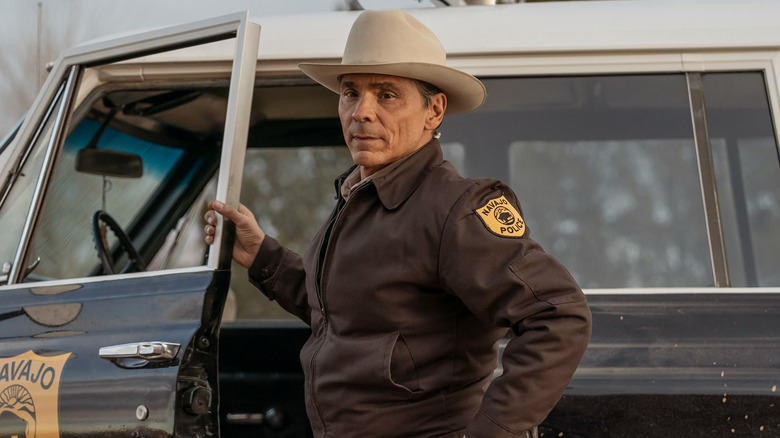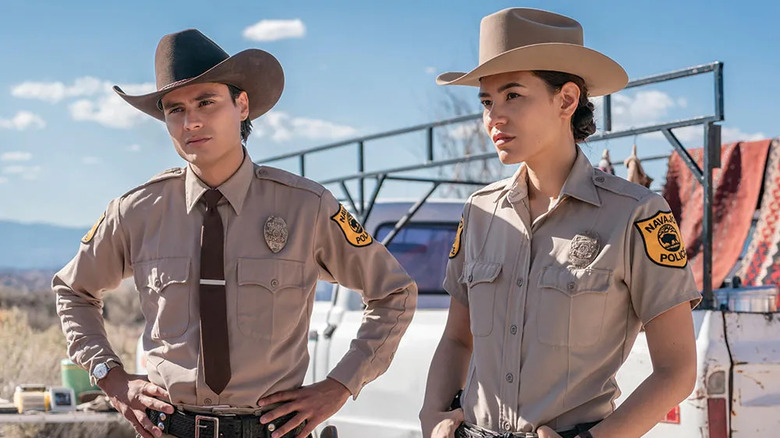Western Fans Have To Check Out George R. R. Martin And Robert Redford's Thriller Series On Netflix
Though the dads of the world might disagree, Taylor Sheridan isn't the sole party keeping the Western alive and well in 2025. Beyond the "Yellowstone" architect's ever-growing empire of horse operas, there are plenty of other entries in the genre that have something meaningful to say. Some of these offerings continue the revisionist trend of unearthing the dark truths of U.S. history (as is the case with Netflix's brutal Western TV drama "American Primeval"), while others take the form of neo-Westerns exploring the eternal struggle between justice and power in a more modern context. But what about one that examines this conflict from a less traditional (a polite way of saying "John-Wayne-type-riding-in-to-save-the-day") perspective?
Enter "Dark Winds," AMC's acclaimed small screen adaptation of the late Tony Hillerman's best-selling "Leaphorn & Chee" novels. The show boasts quite the notable caliber of behind the scenes talent, most pointedly executive producers George R.R. Martin and Robert Redford (who even shared an amusing scene on the series prior to Redford's passing this year). But it's the duo's fellow EP and the show's star, Zahn McClarnon, who really deserves to be given his flowers for the thriller/drama's sterling reputation. That's doubly true if you mainly know the actor for his turn as easygoing Officer Big on Sterlin Harjo's wonderful dramedy series "Reservation Dogs."
A far cry from Big (who wouldn't feel out of place in a stoner comedy, as evidenced by his involvement in some of the zanier episodes of Harjo's show), McClarnon's tribal police officer Joe Leaphorn carries himself with the weight of a middle-aged man who's spent his whole life trying to do right by his marginalized community. He's also suffered his share of personal heartbreak along the way, as those who've caught up on the series' earlier seasons on Netflix could tell you.
Dark Winds is a neo-Western that gives Indigenous Americans the spotlight
Taking place in the 1970s, "Dark Winds" follows Leaphorn as he upholds the law in the Four Corners, an area in the Southwest U.S. that primarily belongs to assorted Indigenous American nations. (Okay, really the entire country "belongs" to Indigenous Americans, but you follow my meaning.) At its core, the show is a buddy story about Leaphorn and Jim Chee (Kiowa Gordon), the younger and cockier FBI agent who eventually becomes the former's partner. Narratively, however, "Dark Winds" typically plays out as a slow-burn crime thriller that's less concerned with Leaphorn and Chee busting each other's chops — although they do that as well — and more focused on the plight of its characters, be they wrestling with moral dilemmas or matters more specific to present-day Indigenous Americans.
To that point: "Dark Winds" is at its best when it's using neo-Western/crime tropes as a springboard for dealing with topics that are near and dear to its leads' hearts. Whether it concerns the death of someone's child or the sterilization of Indigenous women without their consent, the show's creatives (including creator Graham Roland) never hesitate to get heavy when certain storylines call for it. In fact, most of the series' strongest subplots concern the women in Leaphorn and Chee's lives, specifically Emma (Deanna Allison), a nurse and Leaphorn's wife, and Bernadette Manuelito (Jessica Matten), a proficient officer who shares more than a spark of romantic chemistry with Chee.
Despite some creaky storytelling at times (some of which, admittedly, stems from the show's source material), "Dark Winds" is a thoughtful, well-acted, and otherwise engaging addition to the current neo-Western landscape. Sheridan's oaters may get the lion's share of attention, but don't let this one slip you by.
"Dark Winds" is streaming on AMC+ and Netflix.

